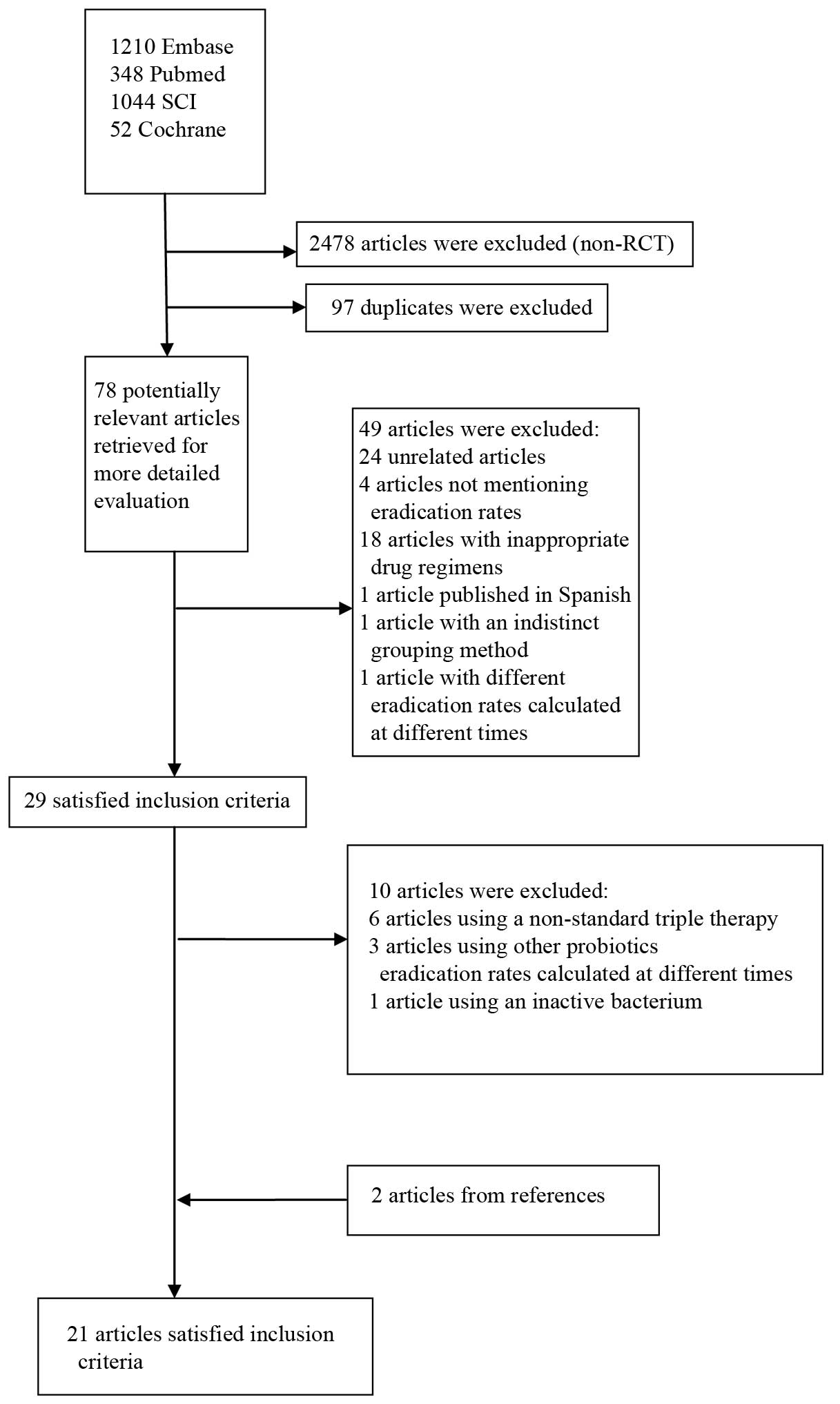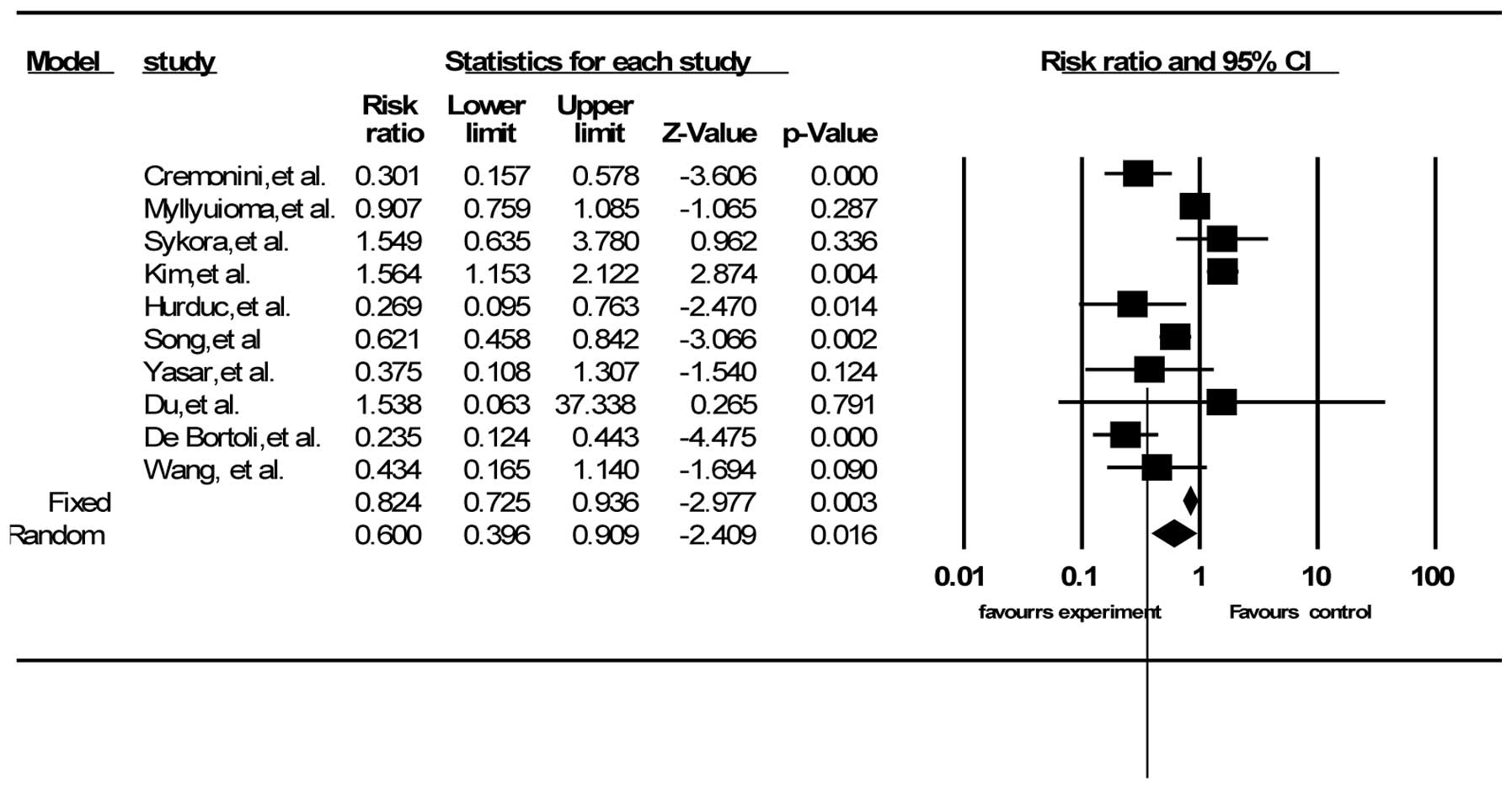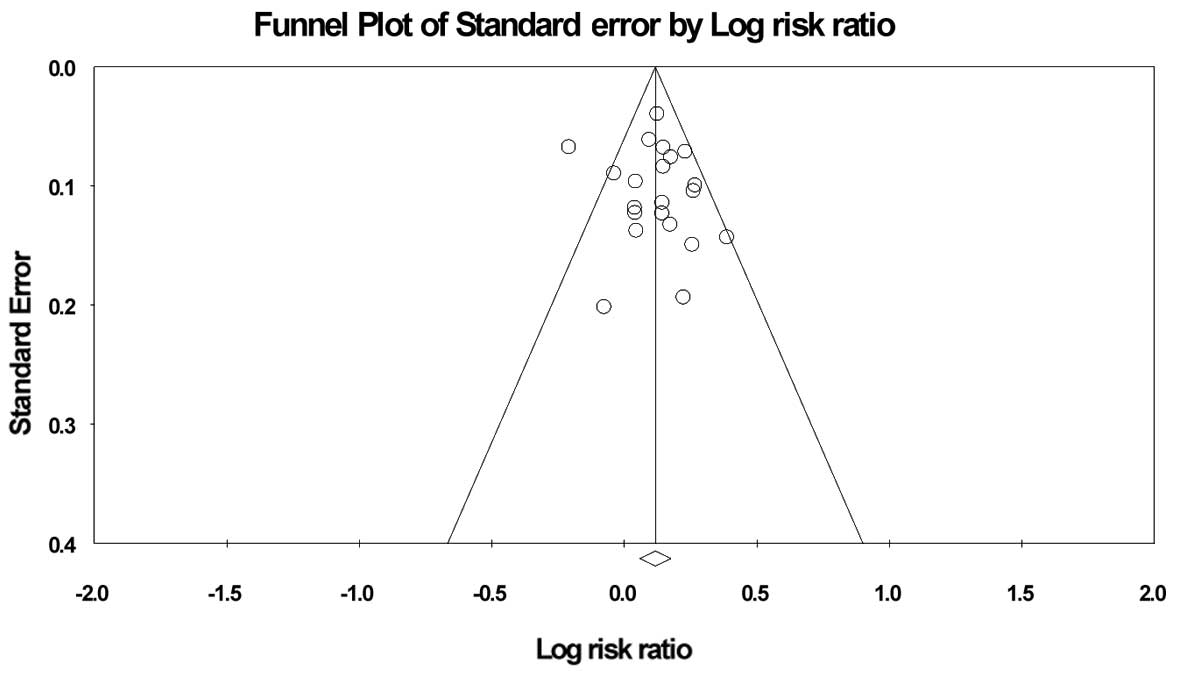|
1
|
Go MF: Review article: natural history and
epidemiology of Helicobacter pylori infection. Aliment Pharmacol
Ther. 16(Suppl 1): 3–15. 2002. View Article : Google Scholar : PubMed/NCBI
|
|
2
|
Chey WD and Wong BC; Practice Parameters
Committee of the American College of Gastroenterology. American
College of Gastroenterology guideline on the management of
Helicobacter pylori infection. Am J Gastroenterol. 102:1808–1825.
2007. View Article : Google Scholar : PubMed/NCBI
|
|
3
|
Malfertheiner P, Megraud F, O’Morain CA,
et al: Management of Helicobacter pylori infection - the Maastricht
IV/Florence consensus report. Gut. 61:646–664. 2012. View Article : Google Scholar : PubMed/NCBI
|
|
4
|
Bell GD, Powell K, Burridge SM, et al:
Experience with ‘triple’ anti-Helicobacter pylori eradication
therapy: side effects and the importance of testing the
pre-treatment bacterial isolate for metronidazole resistance.
Aliment Pharmacol Ther. 6:427–435. 1992. View Article : Google Scholar : PubMed/NCBI
|
|
5
|
Bhatia SJ, Kochar N, Abraham P, Nair NG
and Mehta AP: Lactobacillus acidophilus inhibits growth of
Campylobacter pylori in vitro. J Clin Microbiol. 27:2328–2330.
1989.PubMed/NCBI
|
|
6
|
Mukai T, Asasaka T, Sato E, et al:
Inhibition of binding of Helicobacter pylori to the glycolipid
receptors by probiotic Lactobacillus reuteri. FEMS Immunol Med
Microbiol. 32:105–110. 2002. View Article : Google Scholar : PubMed/NCBI
|
|
7
|
Johnson-Henry KC, Mitchell DJ, Avitzur Y,
et al: Probiotics reduce bacterial colonization and gastric
inflammation in H. pylori-infected mice. Dig Dis Sci. 49:1095–1102.
2004. View Article : Google Scholar : PubMed/NCBI
|
|
8
|
Hsieh PS, Tsai YC, Chen YC, et al:
Eradication of Helicobacter pylori infection by the probiotic
strains Lactobacillus johnsonii MH-68 and L. salivarius ssp
salicinius AP-32. Helicobacter. 17:466–477. 2012. View Article : Google Scholar : PubMed/NCBI
|
|
9
|
Tursi A, Brandimarte G, Giorgetti GM and
Modeo ME: Effect of Lactobacillus casei supplementation on the
effectiveness and tolerability of a new second-line 10-day
quadruple therapy after failure of a first attempt to cure
Helicobacter pylori infection. Med Sci Monit. 10:CR662–CR666.
2004.PubMed/NCBI
|
|
10
|
Lionetti E, Indrio F, Pavone L, et al:
Role of probiotics in pediatric patients with Helicobacter pylori
infection: a comprehensive review of the literature. Helicobacter.
15:79–87. 2010. View Article : Google Scholar : PubMed/NCBI
|
|
11
|
Ozdil K, Calhan T, Sahin A, et al:
Levofloxacin based sequential and triple therapy compared with
standard plus probiotic combination for Helicobacter pylori
eradication. Hepatogastroenterology. 58:1148–1152. 2011. View Article : Google Scholar : PubMed/NCBI
|
|
12
|
Yoon H, Kim N, Kim JY, et al: Effects of
multistrain probiotic-containing yogurt on second-line triple
therapy for Helicobacter pylori infection. J Gastroenterol Hepatol.
26:44–48. 2011. View Article : Google Scholar
|
|
13
|
Scaccianoce G, Zullo A, Hassan C, et al:
Triple therapies plus different probiotics for Helicobacter pylori
eradication. Eur Rev Med Pharmacol Sci. 12:251–256. 2008.PubMed/NCBI
|
|
14
|
Ahmad K, Fatemeh F, Mehri N and Maryam S:
Probiotics for the treatment of pediatric Helicobacter pylori
infection: a randomized double blind clinical trial. Iran J
Pediatr. 23:79–84. 2013.PubMed/NCBI
|
|
15
|
Tong JL, Ran ZH, Shen J, Zhang CX and Xiao
SD: Meta-analysis: the effect of supplementation with probiotics on
eradication rates and adverse events during Helicobacter pylori
eradication therapy. Aliment Pharmacol Ther. 25:155–168. 2007.
View Article : Google Scholar : PubMed/NCBI
|
|
16
|
Szajewska H, Horvath A and Piwowarczyk A:
Meta-analysis: the effects of Saccharomyces boulardii
supplementation on Helicobacter pylori eradication rates and side
effects during treatment. Aliment Pharmacol Ther. 32:1069–1079.
2010. View Article : Google Scholar : PubMed/NCBI
|
|
17
|
Zou J, Dong J and Yu X: Meta-analysis:
Lactobacillus containing quadruple therapy versus standard triple
first-line therapy for Helicobacter pylori eradication.
Helicobacter. 14:97–107. 2009. View Article : Google Scholar : PubMed/NCBI
|
|
18
|
Wang ZH, Gao QY and Fang JY: Meta-analysis
of the efficacy and safety of Lactobacillus-containing and
Bifidobacterium-containing probiotic compound preparation in
Helicobacter pylori eradication therapy. J Clin Gastroenterol.
47:25–32. 2013. View Article : Google Scholar
|
|
19
|
Sachdeva A and Nagpal J: Effect of
fermented milk-based probiotic preparations on Helicobacter pylori
eradication: a systematic review and meta-analysis of
randomized-controlled trials. Eur J Gastroenterol Hepatol.
21:45–53. 2009. View Article : Google Scholar
|
|
20
|
Zheng X, Lyu L and Mei Z:
Lactobacillus-containing probiotic supplementation increases
Helicobacter pylori eradication rate: evidence from a
meta-analysis. Rev Esp Enferm Dig. 105:445–453. 2013. View Article : Google Scholar : PubMed/NCBI
|
|
21
|
Shavakhi A, Tabesh E, Yaghoutkar A, et al:
The effects of multistrain probiotic compound on bismuth-containing
quadruple therapy for Helicobacter pylori infection: a randomized
placebo-controlled triple-blind study. Helicobacter. 18:280–284.
2013. View Article : Google Scholar : PubMed/NCBI
|
|
22
|
Navarro-Rodriguez T, Silva FM, Barbuti RC,
et al: Association of a probiotic to a Helicobacter pylori
eradication regimen does not increase efficacy or decreases the
adverse effects of the treatment: a prospective, randomized,
double-blind, placebo-controlled study. BMC Gastroenterol.
13:562013. View Article : Google Scholar : PubMed/NCBI
|
|
23
|
Matsushima M and Takagi A: ‘Is it
effective?’ to ‘How to use it?’: the era has changed in probiotics
and functional food products against Helicobacter pylori infection.
J Gastroenterol Hepatol. 27:851–853. 2012. View Article : Google Scholar : PubMed/NCBI
|
|
24
|
Boyanova L and Mitov I: Coadministration
of probiotics with antibiotics: why, when and for how long? Expert
Rev Anti Infect Ther. 10:407–409. 2012. View Article : Google Scholar : PubMed/NCBI
|
|
25
|
Liberati A, Altman DG, Tetzlaff J, et al:
The PRISMA statement for reporting systematic reviews and
meta-analyses of studies that evaluate healthcare interventions:
explanation and elaboration. BMJ. 339:b27002009. View Article : Google Scholar : PubMed/NCBI
|
|
26
|
Jadad AR, Moore RA, Carroll D, et al:
Assessing the quality of reports of randomized clinical trials: is
blinding necessary? Control Clin Trials. 17:1–12. 1996. View Article : Google Scholar : PubMed/NCBI
|
|
27
|
Downs SH and Black N: The feasibility of
creating a checklist for the assessment of the methodological
quality both of randomised and non-randomised studies of health
care interventions. J Epidemiol Community Health. 52:377–384. 1998.
View Article : Google Scholar : PubMed/NCBI
|
|
28
|
Sahagún-Flores JE, López-Peña LS, de la
Cruz-Ramírez Jaimes J, et al: Eradication of Helicobacter pylori:
triple treatment scheme plus Lactobacillus vs. triple treatment
alone. Cir Cir. 75:333–336. 2007.(In Spanish).
|
|
29
|
Ziemniak W: Efficacy of Helicobacter
pylori eradication taking into account its resistance to
antibiotics. J Physiol Pharmacol. 57(Suppl 3): 123–141.
2006.PubMed/NCBI
|
|
30
|
Sheu BS, Cheng HC, Kao AW, et al:
Pretreatment with Lactobacillus- and Bifidobacterium-containing
yogurt can improve the efficacy of quadruple therapy in eradicating
residual Helicobacter pylori infection after failed triple therapy.
Am J Clin Nutr. 83:864–869. 2006.PubMed/NCBI
|
|
31
|
Lionetti E, Miniello VL, Castellaneta SP,
et al: Lactobacillus reuteri therapy to reduce side-effects during
anti-Helicobacter pylori treatment in children: a randomized
placebo controlled trial. Aliment Pharmacol Ther. 24:1461–1468.
2006. View Article : Google Scholar : PubMed/NCBI
|
|
32
|
Manfredi M, Bizzarri B, Sacchero RI, et
al: Helicobacter pylori infection in clinical practice: probiotics
and a combination of probiotics + lactoferrin improve compliance,
but not eradication, in sequential therapy. Helicobacter.
17:254–263. 2012. View Article : Google Scholar : PubMed/NCBI
|
|
33
|
Xu C, Xiao L and Zou H: Effect of birid
triple viable on peptic ulcer patients with Helicobacter pylori
infection. Zhong Nan Da Xue Xue Bao Yi Xue Ban. 35:1000–1004.
2010.(In Chinese). PubMed/NCBI
|
|
34
|
Park SK, Park DI, Choi JS, et al: The
effect of probiotics on Helicobacter pylori eradication.
Hepatogastroenterology. 54:2032–2036. 2007.
|
|
35
|
Bekar O, Yilmaz Y and Gulten M: Kefir
improves the efficacy and tolerability of triple therapy in
eradicating Helicobacter pylori. J Med Food. 14:344–347. 2011.
View Article : Google Scholar
|
|
36
|
Nista EC, Candelli M, Cremonini F, et al:
Bacillus clausii therapy to reduce side-effects of
anti-Helicobacter pylori treatment: randomized, double-blind,
placebo controlled trial. Aliment Pharmacol Ther. 20:1181–1188.
2004. View Article : Google Scholar : PubMed/NCBI
|
|
37
|
Canducci F, Armuzzi A, Cremonini F, et al:
A lyophilized and inactivated culture of Lactobacillus acidophilus
increases Helicobacter pylori eradication rates. Aliment Pharmacol
Ther. 14:1625–1629. 2000. View Article : Google Scholar : PubMed/NCBI
|
|
38
|
Wang YH and Huang Y: Effect of
Lactobacillus acidophilus and Bifidobacterium bifidum
supplementation to standard triple therapy on Helicobacter pylori
eradication and dynamic changes in intestinal flora. World J
Microbiol Biotechnol. 30:847–853. 2014. View Article : Google Scholar
|
|
39
|
Dajani AI, Abu Hammour AM, Yang DH, et al:
Do probiotics improve eradication response to Helicobacter pylori
on standard triple or sequential therapy? Saudi J Gastroenterol.
19:113–120. 2013. View Article : Google Scholar : PubMed/NCBI
|
|
40
|
Armuzzi A, Cremonini F, Bartolozzi F, et
al: The effect of oral administration of Lactobacillus GG on
antibiotic-associated gastrointestinal side-effects during
Helicobacter pylori eradication therapy. Aliment Pharmacol Ther.
15:163–169. 2001. View Article : Google Scholar : PubMed/NCBI
|
|
41
|
Armuzzi A, Cremonini F, Ojetti V, et al:
Effect of Lactobacillus GG supplementation on antibiotic-associated
gastrointestinal side effects during Helicobacter pylori
eradication therapy: a pilot study. Digestion. 63:1–7. 2001.
View Article : Google Scholar : PubMed/NCBI
|
|
42
|
Cremonini F, Di Caro S, Covino M, et al:
Effect of different probiotic preparations on anti-Helicobacter
pylori therapy-related side effects: a parallel group, triple
blind, placebo-controlled study. Am J Gastroenterol. 97:2744–2749.
2002. View Article : Google Scholar : PubMed/NCBI
|
|
43
|
Sheu BS, Wu JJ, Lo CY, et al: Impact of
supplement with Lactobacillus- and Bifidobacterium-containing
yogurt on triple therapy for Helicobacter pylori eradication.
Aliment Pharmacol Ther. 16:1669–1675. 2002. View Article : Google Scholar : PubMed/NCBI
|
|
44
|
Myllyluoma E, Veijola L, Ahlroos T, et al:
Probiotic supplementation improves tolerance to Helicobacter pylori
eradication therapy - a placebo-controlled, double-blind randomized
pilot study. Aliment Pharmacol Ther. 21:1263–1272. 2005. View Article : Google Scholar : PubMed/NCBI
|
|
45
|
Sýkora J, Valecková K, Amlerová J, et al:
Effects of a specially designed fermented milk product containing
probiotic Lactobacillus casei DN-114 001 and the eradication of H.
pylori in children: a prospective randomized double-blind study. J
Clin Gastroenterol. 39:692–698. 2005. View Article : Google Scholar : PubMed/NCBI
|
|
46
|
Plewińska EM, Płaneta-Małecka I,
Bąk-Romaniszyn L, Czkwianianc E and Małecka-Panas E: Probiotics in
the treatment of Helicobacter pylori infection in children.
Gastroenterologia Polska. 13:315–319. 2006.
|
|
47
|
de Bortoli N, Leonardi G, Ciancia E, et
al: Helicobacter pylori eradication: a randomized prospective study
of triple therapy versus triple therapy plus lactoferrin and
probiotics. Am J Gastroenterol. 102:951–956. 2007. View Article : Google Scholar : PubMed/NCBI
|
|
48
|
Cindoruk M, Erkan G, Karakan T, Dursun A
and Unal S: Efficacy and safety of Saccharomyces boulardii in the
14-day triple anti-Helicobacter pylori therapy: a prospective
randomized placebo-controlled double-blind study. Helicobacter.
12:309–316. 2007. View Article : Google Scholar : PubMed/NCBI
|
|
49
|
Kim MN, Kim N, Lee SH, et al: The effects
of probiotics on PPI-triple therapy for Helicobacter pylori
eradication. Helicobacter. 13:261–268. 2008. View Article : Google Scholar : PubMed/NCBI
|
|
50
|
Hurduc V, Plesca D, Dragomir D, Sajin M
and Vandenplas Y: A randomized, open trial evaluating the effect of
Saccharomyces boulardii on the eradication rate of Helicobacter
pylori infection in children. Acta Paediatr. 98:127–131. 2009.
View Article : Google Scholar
|
|
51
|
Szajewska H, Albrecht P and
Topczewska-Cabanek A: Randomized, double-blind, placebo-controlled
trial: effect of Lactobacillus GG supplementation on Helicobacter
pylori eradication rates and side effects during treatment in
children. J Pediatr Gastroenterol Nutr. 48:431–436. 2009.
View Article : Google Scholar : PubMed/NCBI
|
|
52
|
Song MJ, Park DI, Park JH, et al: The
effect of probiotics and mucoprotective agents on PPI-based triple
therapy for eradication of Helicobacter pylori. Helicobacter.
15:206–213. 2010. View Article : Google Scholar : PubMed/NCBI
|
|
53
|
Yaşar B, Abut E, Kayadıbı H, et al:
Efficacy of probiotics in Helicobacter pylori eradication therapy.
Turk J Gastroenterol. 21:212–217. 2010.
|
|
54
|
Medeiros JA, Gonçalves TM, Boyanova L, et
al: Evaluation of Helicobacter pylori eradication by triple therapy
plus Lactobacillus acidophilus compared to triple therapy alone.
Eur J Clin Microbiol Infect Dis. 30:555–559. 2011. View Article : Google Scholar : PubMed/NCBI
|
|
55
|
Deguchi R, Nakaminami H, Rimbara E, et al:
Effect of pretreatment with Lactobacillus gasseri OLL2716 on
first-line Helicobacter pylori eradication therapy. J Gastroenterol
Hepatol. 27:888–892. 2012. View Article : Google Scholar :
|
|
56
|
Du YQ, Su T, Fan JG, et al: Adjuvant
probiotics improve the eradication effect of triple therapy for
Helicobacter pylori infection. World J Gastroenterol. 18:6302–6307.
2012. View Article : Google Scholar : PubMed/NCBI
|
|
57
|
Tolone S, Pellino V, Vitaliti G, Lanzafame
A and Tolone C: Evaluation of Helicobacter pylori eradication in
pediatric patients by triple therapy plus lactoferrin and
probiotics compared to triple therapy alone. Ital J Pediatr.
38:632012. View Article : Google Scholar : PubMed/NCBI
|
|
58
|
Gotteland M, Brunser O and Cruchet S:
Systematic review: are probiotics useful in controlling gastric
colonization by Helicobacter pylori? Aliment Pharmacol Ther.
23:1077–1086. 2006. View Article : Google Scholar : PubMed/NCBI
|
|
59
|
Yang YJ and Sheu BS: Probiotics-containing
yogurts suppress Helicobacter pylori load and modify immune
response and intestinal microbiota in the Helicobacter
pylori-infected children. Helicobacter. 17:297–304. 2012.
View Article : Google Scholar : PubMed/NCBI
|
|
60
|
Kwon HK, Kim GC, Kim Y, et al:
Amelioration of experimental autoimmune encephalomyelitis by
probiotic mixture is mediated by a shift in T helper cell immune
response. Clin Immunol. 146:217–227. 2013. View Article : Google Scholar : PubMed/NCBI
|
|
61
|
Sultana R, McBain AJ and O’Neill CA:
Strain-dependent augmentation of tight-junction barrier function in
human primary epidermal keratinocytes by Lactobacillus and
Bifidobacterium lysates. Appl Environ Microbiol. 79:4887–4894.
2013. View Article : Google Scholar : PubMed/NCBI
|
|
62
|
Yeung CY, Chiang Chiau JS, Chan WT, et al:
In vitro prevention of Salmonella lipopolysaccharide-induced
damages in epithelial barrier function by various Lactobacillus
strains. Gastroenterol Res Pract. 2013:9732092013. View Article : Google Scholar : PubMed/NCBI
|



















